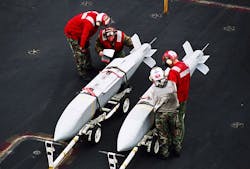Raytheon ready to flight-test an extended-range powered and data-linked JSOW to attack moving ships
Officials of the U.S. Naval Air Systems Command at Patuxent River Naval Air Station, Md., announced an $8.9 million contract Tuesday to the Raytheon Missile Systems segment in Tucson, Ariz., to flight-test extended range capability for the Joint Standoff Weapon AGM-154C-1 all-up-round.
The AGM-154C-1 JSOW adds a Link-16 weapon data link and moving maritime target capability to the AGM-154C JSOW, which has an infrared seeker for terminal guidance, instead of the Global Positioning System (GPS) guidance system of other JSOW variants.
Adding a weapon data link and updated seeker software algorithms to the JSOW provides new capability to enable the munition to attack moving and relocatable targets.
Extending the range of the AGM-154C-1 involves adding a Hamilton-Sundstrand TJ-150 turbojet engine to the ordinarily unpowered JSOW to extend the smart munition's range from 70 to 300 nautical miles.
Related: Raytheon works to capitalize on Excalibur smart munitions technology for naval guns
JSOW is a joint venture between the U.S. Navy and Air Force to produce a standard medium-range precision guided weapon for attacking defended targets from outside the range of standard anti-aircraft defenses.
It is a 1,000-pound air-to-surface missile that can attack fixed and relocatable soft targets like parked aircraft, trucks, armored personnel carriers, and surface-to-air missile sites; mobile targets like battle tanks, self-propelled artillery, wheeled or tracked armored personnel carriers, and light to heavy support vehicles; and industrial facilities, logistical systems, and hardened tactical targets.
The combat aircraft able to carry the JSOW are the Navy and Marine Corps F/A-18C/D Hornet fighter-bombers and F/A-18E/F Super Hornet fighter bombers; the Air Force F-16 Block 40/50, F-15E, and F-35A fighter bombers; and the Air Force B-1B, B-2A, and B-52H heavy bombers.
On this contract Raytheon will do the work in Tucson, Ariz., and should be finished by March 2018. For more information contact Raytheon Missile Systems online at www.raytheon.com, or Naval Air Systems Command at www.navair.navy.mil.
Learn more: search the Aerospace & Defense Buyer's Guide for companies, new products, press releases, and videos
